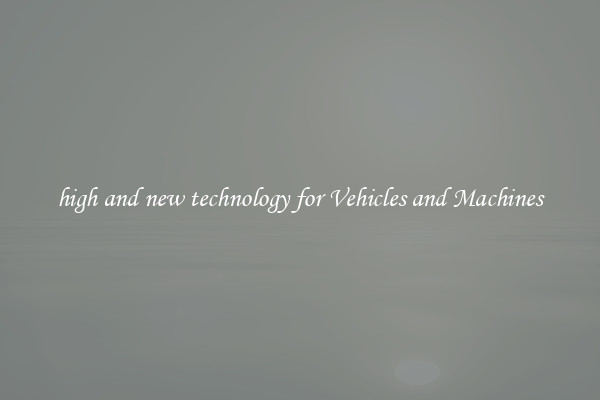high and new technology for Vehicles and Machines
High and New Technology for Vehicles and Machines: Enhancing Efficiency and Safety on the Road

In recent years, we have witnessed remarkable advancements in technology in various fields, particularly in the automotive and machinery industries. These breakthroughs have revolutionized transportation, making vehicles and machines smarter, faster, and safer than ever before. From autonomous cars to cutting-edge construction machinery, the integration of high and new technology has significantly enhanced efficiency and safety, improving people's lives worldwide.
One of the most exciting developments is the emergence of autonomous vehicles. These self-driving cars are equipped with state-of-the-art sensors, cameras, and artificial intelligence systems that allow them to navigate roads without human intervention. With their ability to detect obstacles, pedestrians, and other vehicles, autonomous cars promise to minimize accidents caused by human error. Moreover, these vehicles can optimize traffic flow, reduce congestion, and decrease greenhouse gas emissions, making them a promising solution for sustainable transportation.
Furthermore, technology has enabled vehicles to become more connected and interactive. The advent of the Internet of Things (IoT) has paved the way for intelligent transportation systems, where vehicles are equipped with sensors that collect and transmit data in real-time. This connectivity allows for better traffic management, as vehicles can communicate with traffic lights and other infrastructure to optimize routes and avoid congestion. Additionally, IoT technology can facilitate remote diagnostics and maintenance, ensuring that vehicles are in their optimal condition.
In the realm of machinery, we have seen significant developments as well. Construction, agriculture, and manufacturing industries have embraced high and new technology to improve productivity and safety. For instance, intelligent construction machinery is equipped with advanced sensors and GPS systems that allow for precise digging, grading, and paving. This technology not only reduces human error but also ensures that construction projects are completed more efficiently.
Furthermore, agricultural machinery has undergone a technological revolution. Farmers can now rely on precision farming techniques that utilize GPS technology, drones, and sophisticated sensors to manage crops more effectively. This enables them to monitor soil conditions, predict weather patterns, and optimize irrigation and fertilization, improving yields while minimizing environmental impact.
It is important to note that with these technological advancements come challenges and concerns. Cybersecurity and privacy issues are critical, as any vulnerability in the software that controls these vehicles and machinery could lead to catastrophic consequences. Additionally, the technological divide between developed and developing countries must be bridged to ensure equal access to these innovations.
In conclusion, high and new technology has indubitably transformed vehicles and machinery, enhancing efficiency and safety on the road. Whether through autonomous cars, connected vehicles, or intelligent machinery, these advancements are rapidly reshaping transportation and industry. However, it is crucial to address the potential challenges and ensure responsible implementation to fully harness the benefits of these breakthroughs. With continued innovation and collaboration, the future of vehicles and machines will undoubtedly be even more astonishing.

View details

View details

View details

View details








